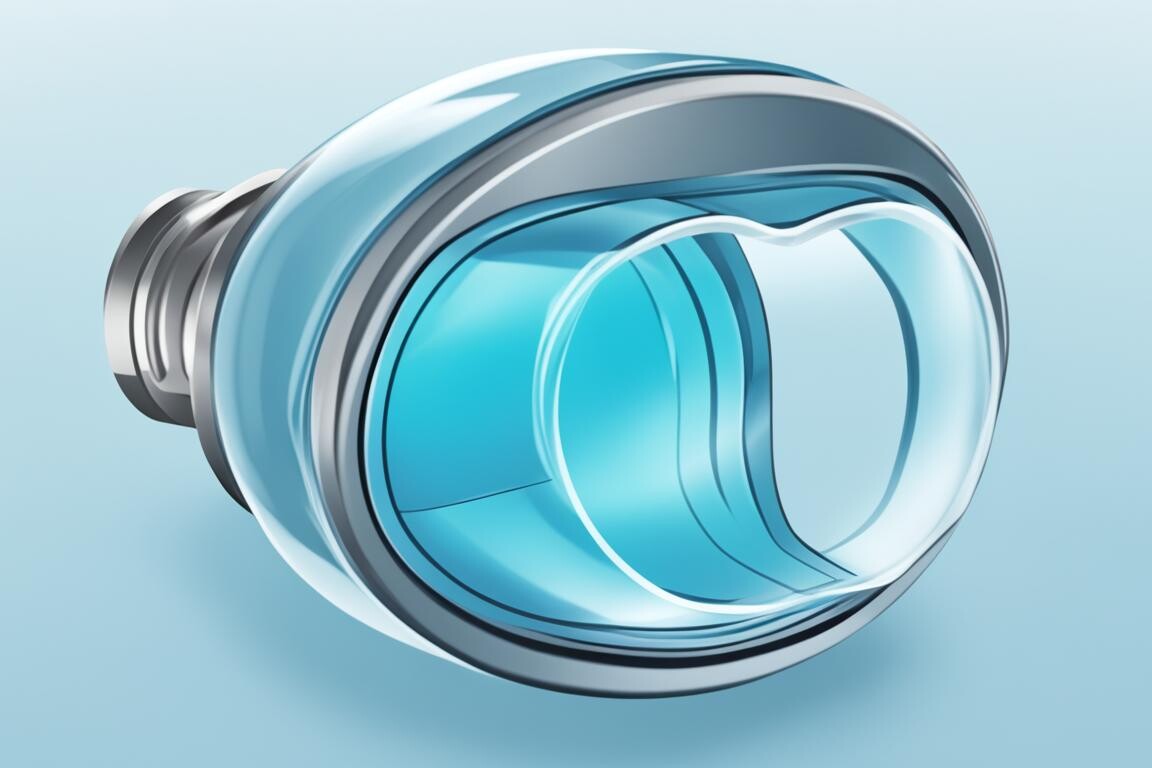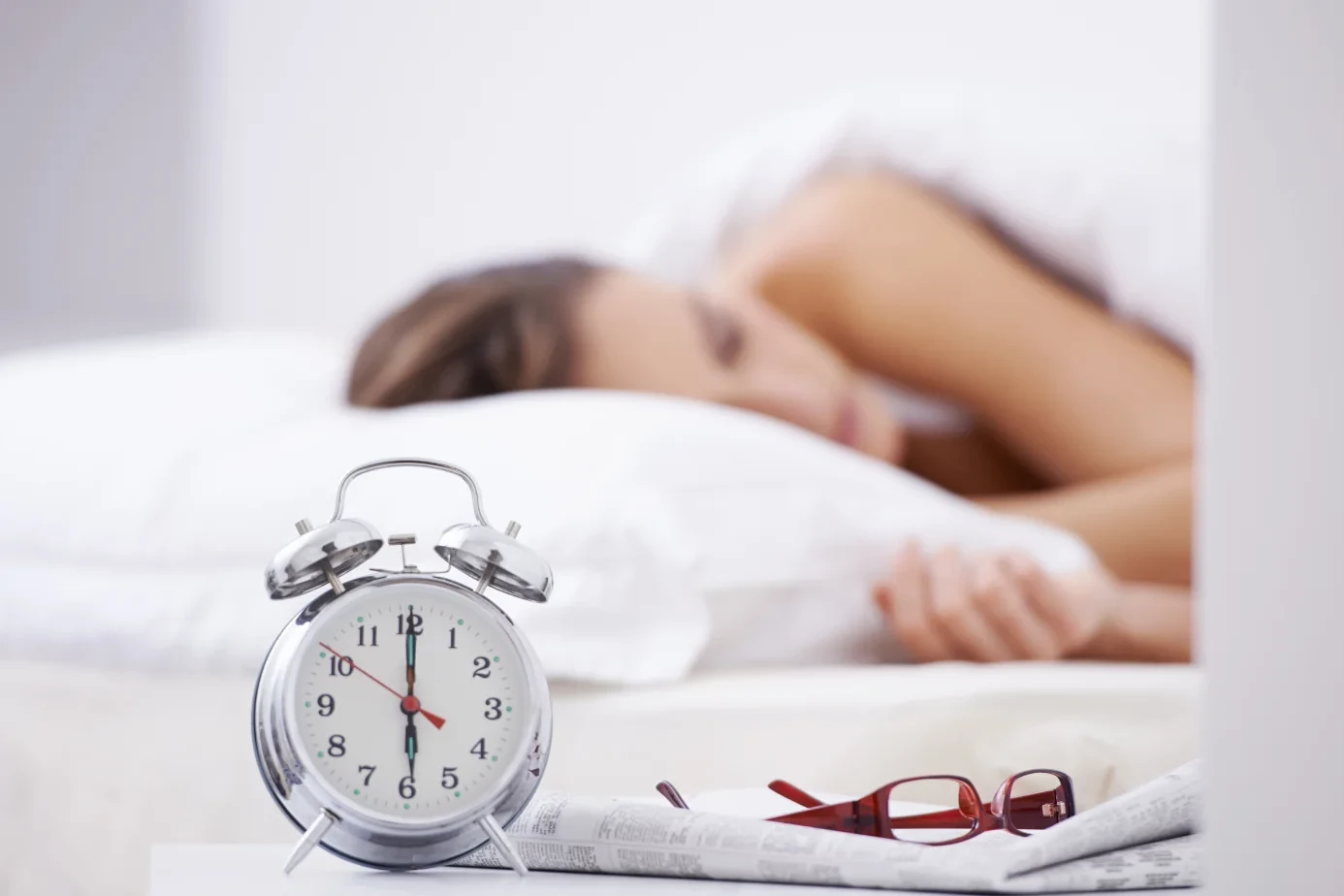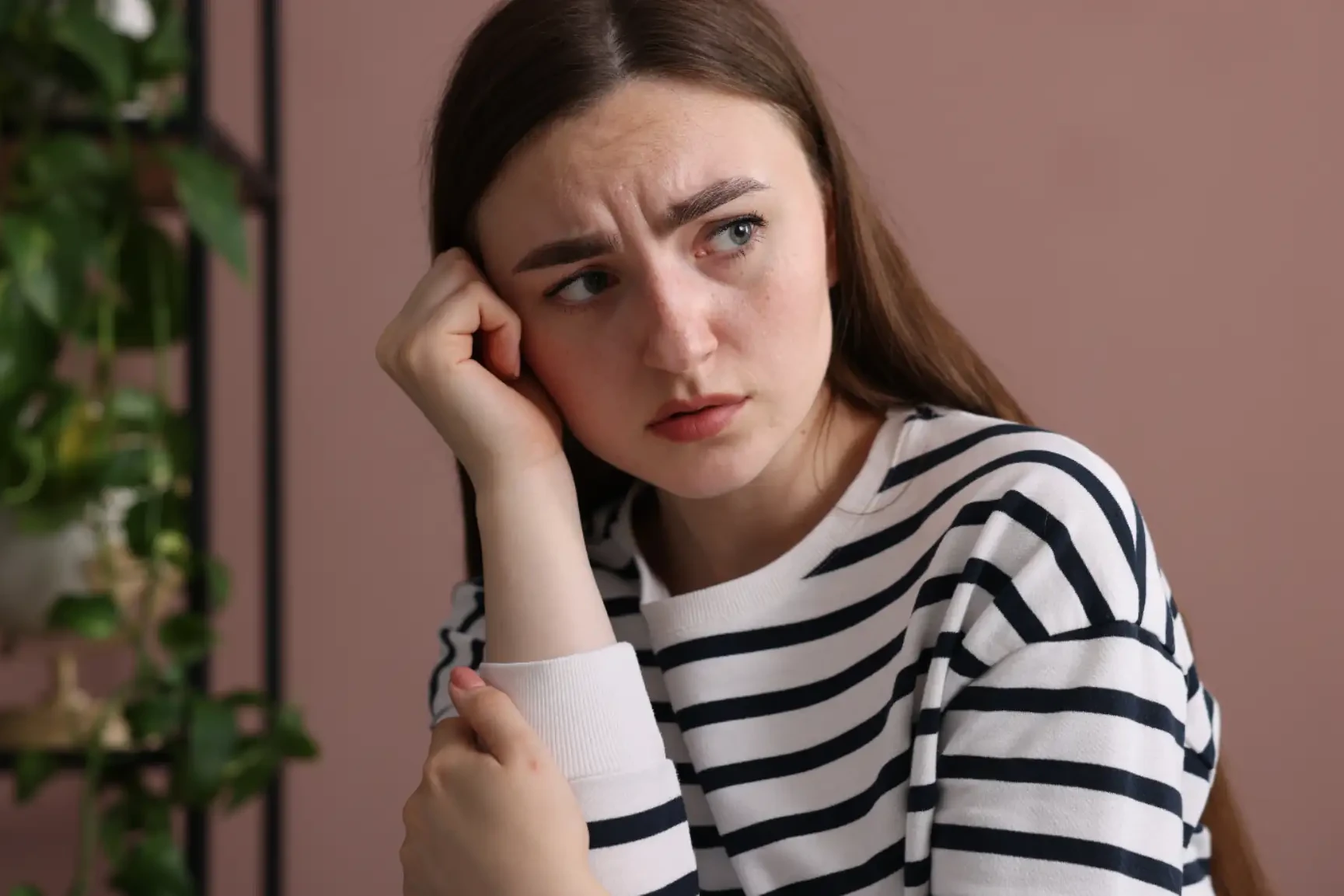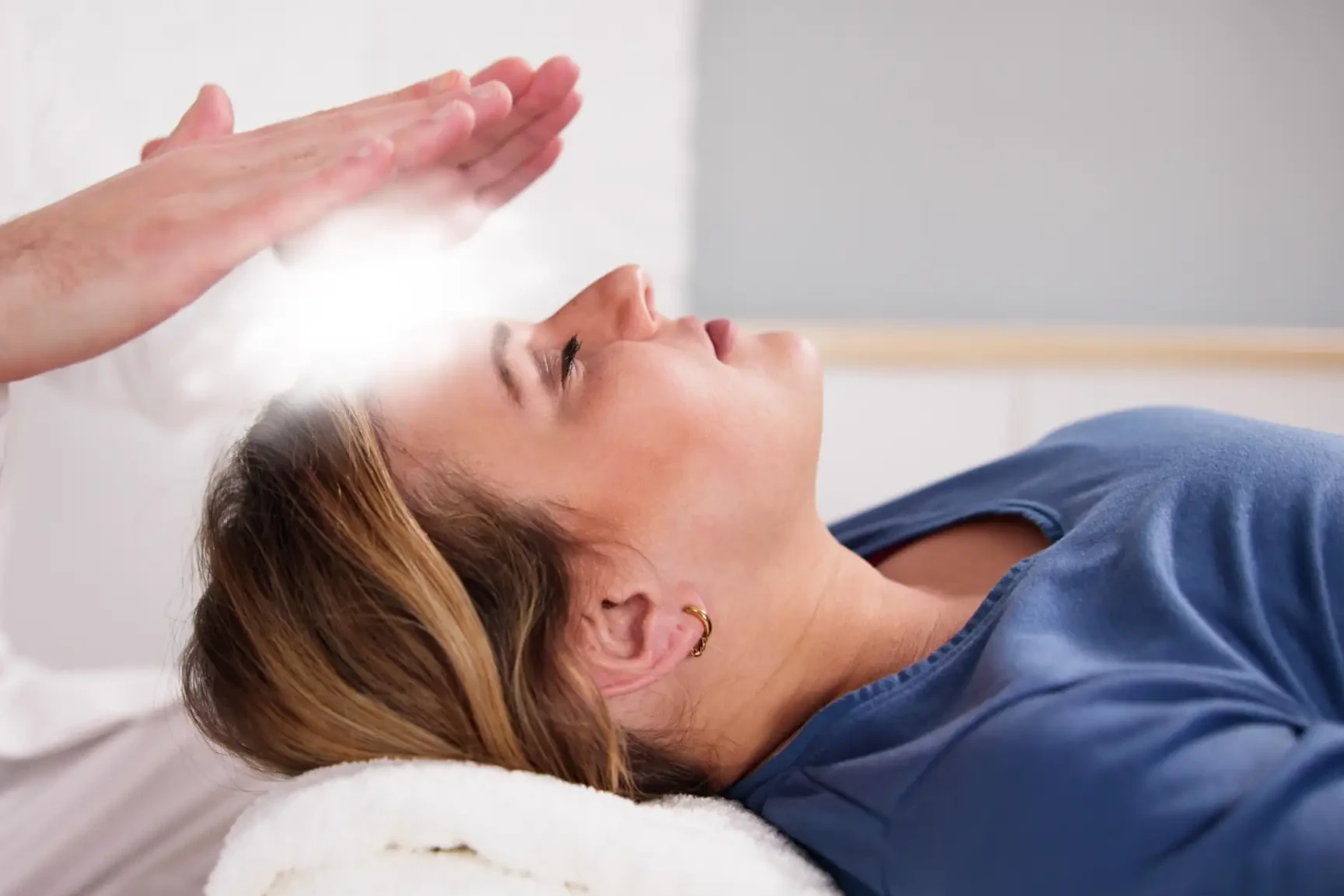If you’re dealing with severe extreme sleep apnea, you’re not alone. This condition means you stop breathing for long periods during sleep. It can lead to serious health issues if not treated. But, there are ways to manage and treat it.
This guide will cover diagnosis and treatment options for extreme sleep apnea. We’ll look at CPAP therapy, oral appliances, surgery, and lifestyle changes. Knowing these options can help you get better sleep and improve your health.
If you’re new to severe sleep apnea or have had it for years, this article is for you. It offers the info and advice you need to find the right treatment. By tackling this issue, you can sleep better and lower your risk of other health problems like heart disease, stroke, and diabetes.
Table of Contents
ToggleDiagnosis of Extreme Sleep Apnea
Diagnosing extreme sleep apnea starts with a detailed look at your symptoms and sleep history. Your doctor will first do a physical exam and ask about your sleep patterns, snoring, and how tired you feel during the day. If they think you might have sleep apnea, you’ll be sent to a sleep specialist for more tests.
Symptoms and Sleep History
To diagnose extreme sleep apnea, your symptoms and sleep history are checked first. Signs include loud snoring, gasping or choking while asleep, waking up often, and feeling very tired during the day. Your doctor will also ask about your sleep habits, like how long you sleep and how rested you feel in the morning.
Sleep Testing and Polysomnography
If your symptoms and sleep history point to possible extreme sleep apnea, your doctor will suggest a sleep study, or polysomnography. This test is done overnight in a sleep center and tracks your breathing, oxygen levels, heart rate, and more. The test results help figure out how severe your sleep apnea is and what treatment you need.
For some, a home sleep test might be an option to diagnose sleep apnea. These tests use portable devices to check your breathing and oxygen levels at home. But, a sleep study at a center is usually preferred if you might have central sleep apnea.
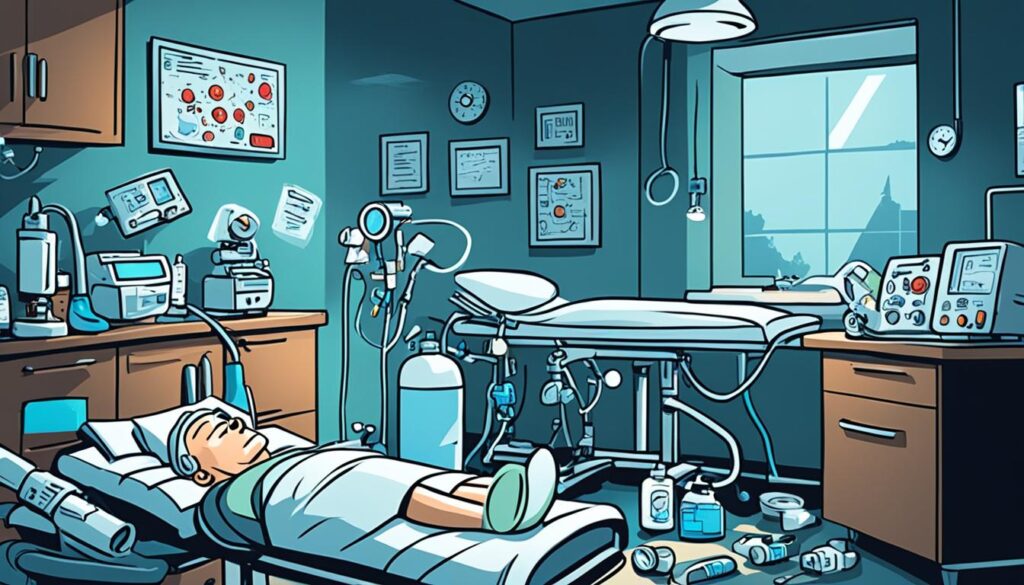
Treatment Options for Extreme Sleep Apnea
For those with moderate to severe sleep apnea, continuous positive airway pressure (CPAP) therapy is often the best choice. CPAP machines send a steady flow of air pressure. This keeps the airways open and stops apnea and snoring.
Continuous Positive Airway Pressure (CPAP) Therapy
CPAP therapy is the top treatment for extreme sleep apnea. It uses a mask or nosepiece to give a constant air pressure. This keeps the airways open all night, improving sleep quality. Studies show CPAP is very effective in handling sleep apnea symptoms.
Other Airway Pressure Devices
If CPAP doesn’t work well, there are other options. Auto-CPAP adjusts the air pressure to match your breathing. Bilevel positive airway pressure (BPAP) gives more pressure when you breathe in and less when you breathe out.
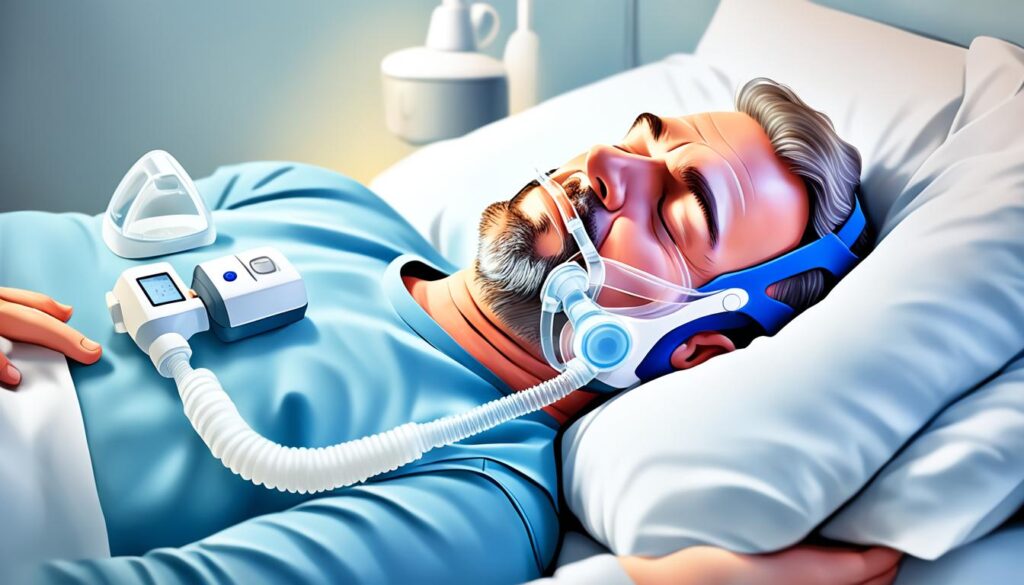
The choice between CPAP and other devices depends on your sleep apnea severity, your preferences, and your doctor’s advice. Getting the right treatment is key to lowering the risks of sleep apnea, like heart disease and stroke.
Oral Appliances for Extreme Sleep Apnea
For some people with mild to moderate sleep apnea, oral appliances can be an option instead of CPAP therapy. These devices are custom-made and prescribed by a dentist. They move the jaw forward to stop the tongue and soft tissues from blocking the airway while sleeping. They’re not as powerful as CPAP for severe sleep apnea but can be easier for some patients.
Mandibular advancement devices (MADs) are the top choice for treating sleep apnea. They move the lower jaw forward to open the airway. For those who can’t use MADs, tongue-stabilizing devices (TSDs) are an option.
- Custom-made oral appliances give the best results for sleep apnea, beating over-the-counter options.
- They work best for people with mild to moderate sleep apnea who can’t use CPAP machines.
- Oral appliance therapy is less effective than CPAP but can still help some people.
It’s key to know that oral appliances aren’t right for everyone. They’re not good for people with central sleep apnea, kids with breathing problems, or those with severe sleep apnea. Regular check-ins with a dentist or sleep expert are needed to see how well the device is working and to handle any side effects.
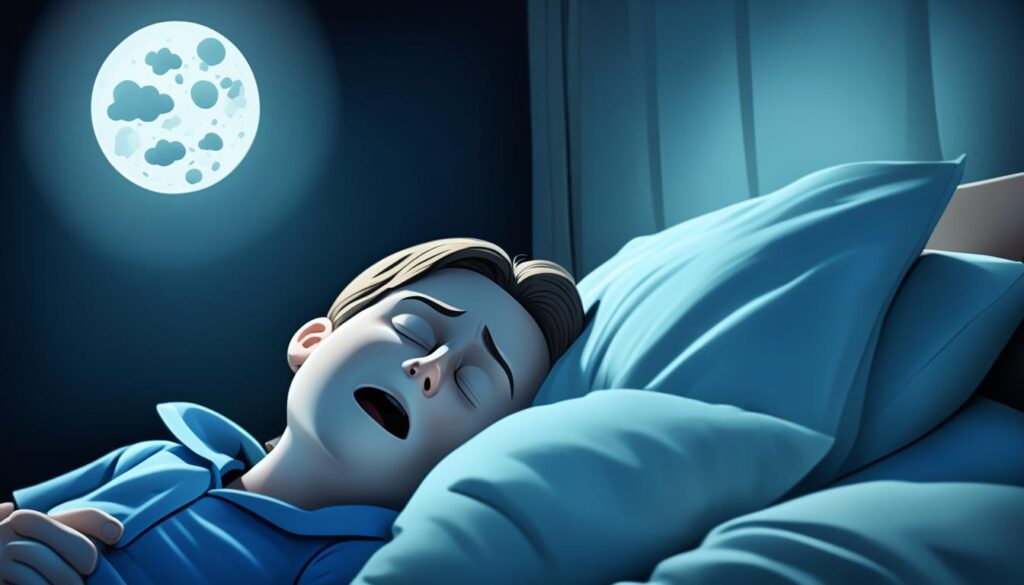
Surgical Interventions
When treatments like CPAP therapy or oral appliances don’t work, surgery might be the last choice. These surgeries aim to fix the body parts that cause sleep apnea.
Tissue Removal and Shrinkage
Removing or shrinking throat tissue can help open up the airway. This includes uvulopalatopharyngoplasty (UPPP), which cuts the uvula and soft palate. Or laser-assisted uvulopalatoplasty (LAUP), which uses a laser to make the uvula and soft palate smaller.
Jaw Repositioning and Implants
Moving the jaw can also widen the airway. Maxillomandibular advancement moves the upper and lower jaws forward. Implants can also support the tongue, keeping it from blocking the airway at night.
Nerve Stimulation Procedures
- Hypoglossal nerve stimulation puts a device in to help keep the airway open by electrically stimulating the tongue muscles.
- Lingual tonsillectomy removes tissue at the base of the tongue to improve airflow.
Surgery for sleep apnea is usually a last choice but can help some people. It’s important to think about the risks and benefits before deciding.
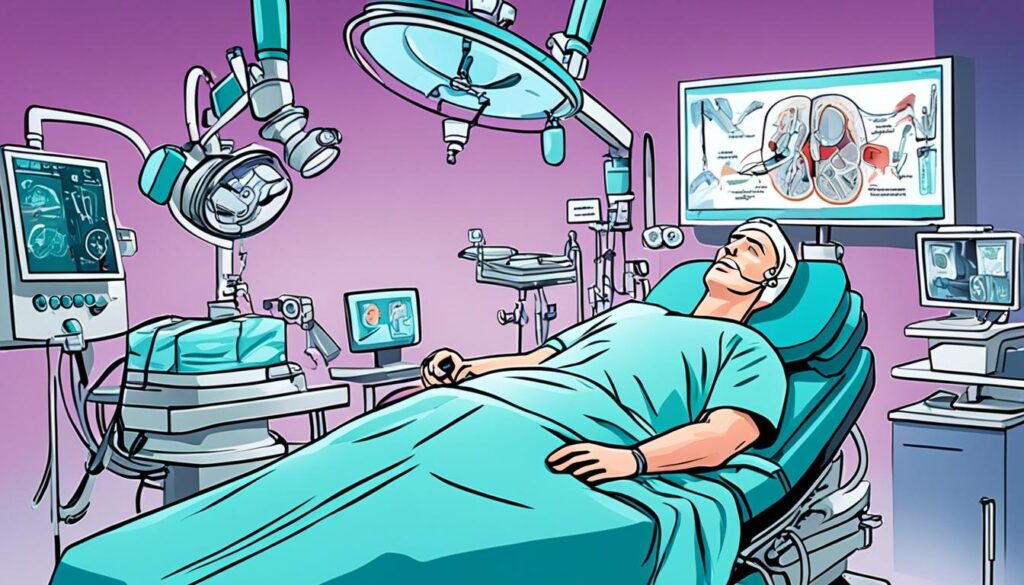
Therapies for Central Sleep Apnea
Central sleep apnea happens when the brain doesn’t control breathing during sleep. It’s different from obstructive sleep apnea, where the airway gets blocked. Treating this condition involves addressing health issues and trying special therapies.
Treating Underlying Medical Conditions
First, find and treat health problems that cause central sleep apnea. Issues like heart failure, stroke, kidney disease, and neurological disorders can lead to it. Fixing these problems can help improve sleep breathing.
Adaptive Servo-Ventilation (ASV)
Adaptive servo-ventilation (ASV) is a therapy for central sleep apnea. It watches your breathing and changes air pressure to keep it steady at night. This is great for people with heart failure or other conditions causing central sleep apnea.
Other treatments like continuous positive airway pressure (CPAP) and bilevel positive airway pressure (BPAP) can also help. These devices support breathing and stop pauses during sleep.
Combining treatment for underlying conditions with therapies like ASV can greatly improve sleep and health. It’s important to work with your healthcare team to find the best treatment for you.
Lifestyle and Home Remedies for Extreme Sleep Apnea
If you’re dealing with extreme sleep apnea, making lifestyle changes and trying home remedies can help a lot. By focusing on your weight, exercise, and medication use, you can help manage your condition. This can also improve how well you sleep.
Weight Loss and Exercise
Carrying extra weight can make sleep apnea worse. Losing a few pounds through healthy eating and regular exercise can ease your symptoms. Activities like brisk walking, swimming, or strength training can also help.
These exercises strengthen your muscles that help you breathe. This makes it easier to breathe while you sleep.
Avoiding Alcohol and Certain Medications
Drinking alcohol and some medications, like sedatives, can relax your throat muscles. This can make sleep apnea worse. Try to limit or avoid these substances.
Instead, stick to a regular sleep schedule, use relaxation techniques, and live a healthy lifestyle. This can help reduce your symptoms.
By making these lifestyle changes and trying home remedies, you can take charge of your sleep apnea. This can also boost your overall health and well-being.
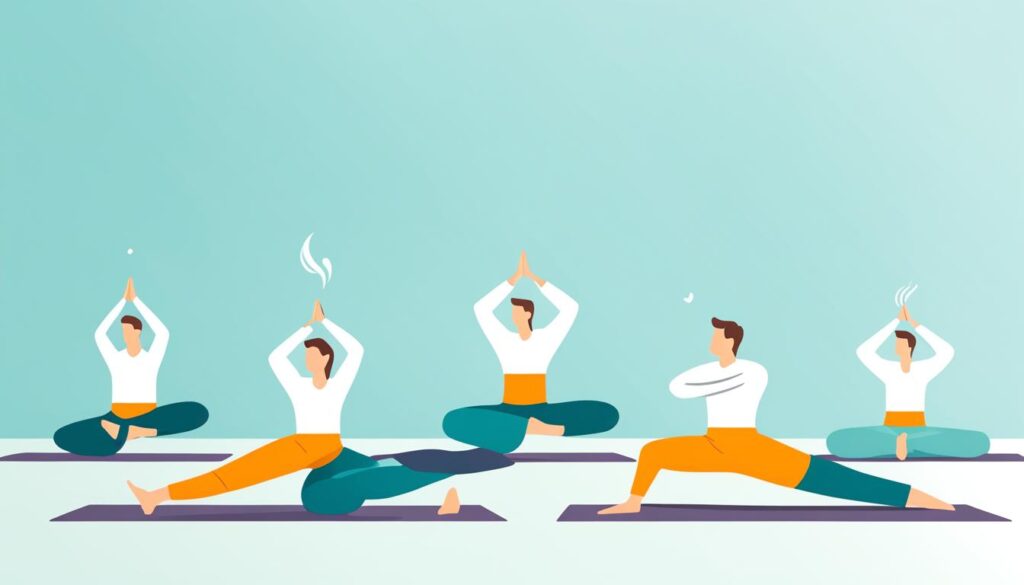
Extreme Sleep Apnea in Children
Sleep apnea is not just for adults; kids can have it too. It can be caused by big tonsils or adenoids, face shape issues, or other health problems. To treat it in kids, doctors use CPAP therapy, oral devices, and surgery to fix the root cause.
Kids with sleep apnea may snore, stop breathing, and have trouble sleeping. They might also be restless. If not treated, it can lead to high blood pressure, high cholesterol, and even prediabetes.
Some kids are more at risk, like those with Down syndrome or certain birth defects. Cerebral palsy and a family history of sleep apnea also increase the risk. In rare cases, it can cause growth problems or even death.
It’s important to catch and treat sleep apnea early to help kids grow and learn well. About 7 to 11 percent of kids have a sleep disorder, but many might not know they have it. Around 1 to 5 percent of kids have obstructive sleep apnea, especially African American kids.
Treatments for kids with severe sleep apnea include CPAP machines, oral devices, losing weight, and surgery. Doctors might send kids for tests like a sleep study to figure out the best treatment.
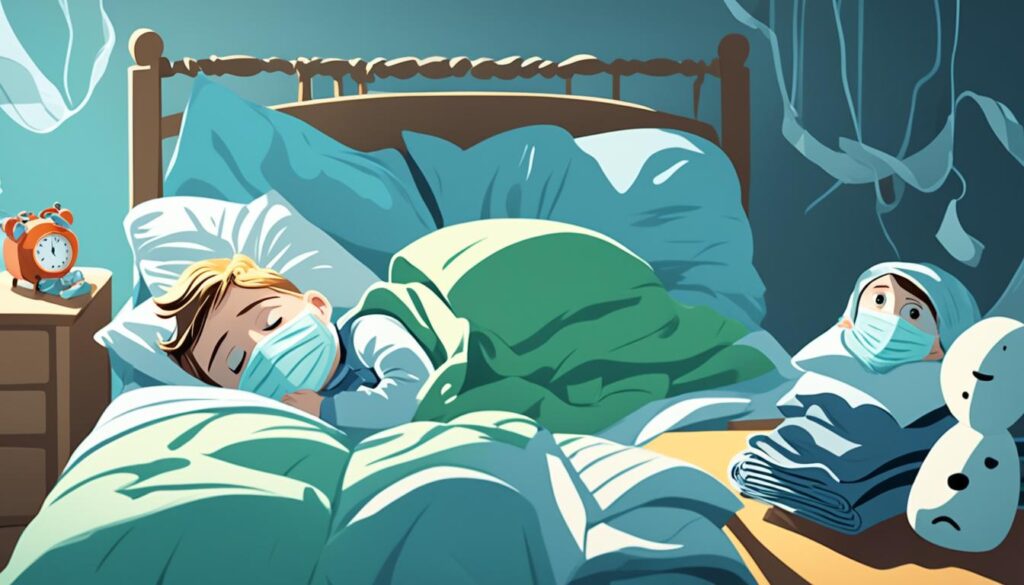
If your child shows signs of sleep apnea, talk to your healthcare team. They can help diagnose and treat it. With the right care, kids with severe sleep apnea can get better and live a healthy life.
Risks and Complications of Untreated Extreme Sleep Apnea
Not treating sleep apnea can lead to serious health issues. High blood pressure is a big risk, which can cause heart disease and stroke. Untreated sleep apnea is also linked to diabetes and sudden cardiac death.
People with extreme sleep apnea may feel tired all day, have trouble thinking clearly, and live a lower quality life. The constant sleep disruptions can affect focus, mood, and overall health.
Men are 2 to 3 times more likely to get obstructive sleep apnea than women. Smoking and being older also increase the risk.
Untreated sleep apnea can affect others too. It can make partners sleep poorly, leading them to sleep elsewhere. It also raises the risk of car and workplace accidents, affecting society as a whole.
To avoid these problems, people with extreme sleep apnea should work with their doctors to find the right treatment. This might include using a CPAP machine, making lifestyle changes, or other treatments.
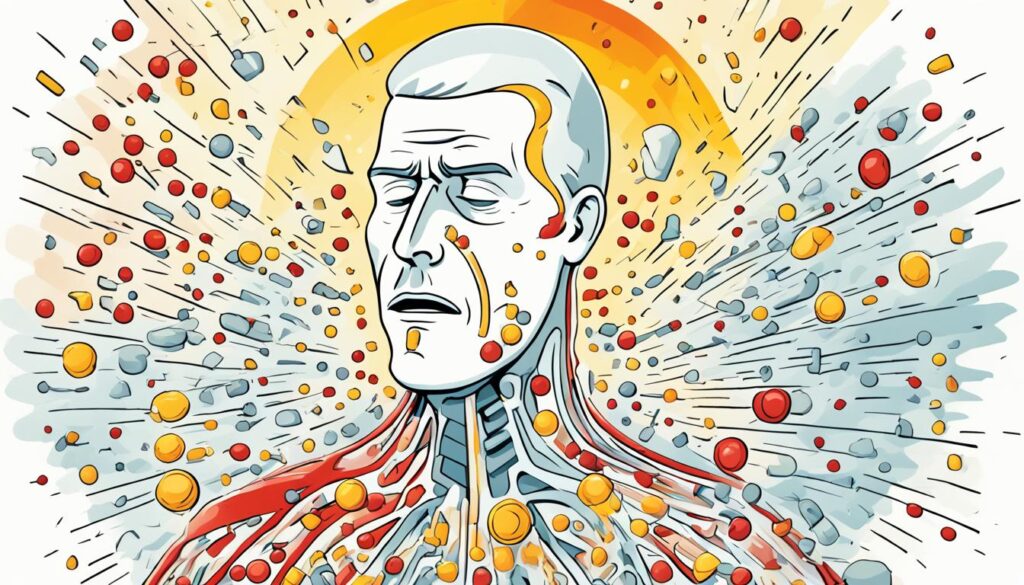
Addressing extreme sleep apnea early can protect your health and the health of your loved ones. The dangers of not treating it are too great to ignore.
Integrative Approaches to Extreme Sleep Apnea Management
Some people with extreme sleep apnea find help in integrative or holistic treatments. These methods can lessen stress, enhance sleep, and work alongside other treatments. They offer a full approach to managing sleep apnea.
Yoga is one such method. It helps with relaxation and breathing. Meditation and mindfulness are also good for the mind.
Acupuncture is another option. It’s a traditional Chinese medicine technique. It aims to ease sleep apnea symptoms by targeting specific body points.
- Herbal remedies and supplements, like valerian root and melatonin, might be tried under a doctor’s advice. They can help with sleep and relaxation.
- Changing your lifestyle is also key. This includes managing weight, exercising, and avoiding alcohol and some drugs. These changes can be part of a full treatment plan.
These integrative methods aren’t a replacement for medical care. Yet, they can be a big help for some with extreme sleep apnea. By mixing traditional and holistic treatments, people can create a well-rounded plan. This plan tackles the complex nature of sleep apnea.
Choosing the Right Treatment Plan
Choosing the right treatment for extreme sleep apnea means looking at several things. These include how severe your condition is, what you prefer, and the good and bad of each therapy. It’s important to work with a team of healthcare experts. This team should include a sleep specialist, your main doctor, and possibly a dentist or ENT specialist. They will help create a sleep apnea treatment plan just for you.
Factors to Consider
When picking a sleep apnea treatment, think about these important factors in treatment:
- The severity of your sleep apnea, based on sleep studies and doctor checks
- Your personal likes and lifestyle, like if you can use a CPAP machine or if you’re okay with surgery
- The good and bad of each treatment, like how well it works, how comfy it is, and any side effects
- Your overall health and any other health issues that might affect treatment choices
Working with Your Healthcare Team
Working with your healthcare team is key to finding the best sleep apnea treatment plan for you. Your team might include:
- A sleep specialist, who can give a full check-up and suggest the best treatment choices
- Your main doctor, who can manage any other health issues and keep an eye on your health during treatment
- A dentist or ENT specialist, who might help with fitting and checking oral devices or surgery
By working with your healthcare team, you can get a sleep apnea treatment plan that fits your needs. This way, you can get the best results.
Monitoring and Adjusting Therapy
Managing extreme sleep apnea often means keeping a close eye on your therapy. You’ll need to check in with your healthcare team, have follow-up sleep studies, and adjust your CPAP settings or other treatments as needed. This careful monitoring helps keep your therapy working well and lets you make changes quickly to get the best results.
It’s important to meet regularly with your sleep specialist or doctor. They can look at your symptoms, check your sleep study results, and adjust your treatment plan if needed. Sometimes, you might need more sleep studies to see how well your therapy is working and if your sleep apnea is getting better or worse.
If you’re using CPAP therapy, your healthcare team might need to change the pressure or try different masks to make sure they fit right and are comfortable. For oral appliances, seeing your dentist regularly is key to check how well they fit and work. You might need to get your appliance adjusted to keep it effective.
Keeping an eye on your sleep apnea treatment and making changes when needed can really help you get the best results. By working with your healthcare team, you can make sure your therapy keeps working well and improve your sleep and daily life.
Remember, managing severe sleep apnea is an ongoing process. Your treatment plan might change over time. Stay alert, talk openly with your healthcare providers, and be open to trying different treatments until you find the one that works best for you.
Living with Extreme Sleep Apnea
Living with extreme sleep apnea can be tough. But, you can make it easier with the right strategies and support. These can help you sleep better and lessen the effects of sleep apnea.
Improving Sleep Quality
Creating a calm sleep area is key for those with extreme sleep apnea. This means keeping the room cool, quiet, and dark. It also means making sure your bed is comfy for sleep.
Good sleep habits also help. Stick to a regular sleep schedule and avoid screens before bed. These steps can make your sleep better.
Managing Daytime Fatigue
Feeling tired during the day is a big issue for many with sleep apnea. To fight this, take regular breaks and stay active. Even a short walk can help increase your energy and health.
Being proactive in managing your sleep apnea and making lifestyle changes can greatly improve your life. Always talk to your healthcare team to find what works best for you.
Support Resources for Extreme Sleep Apnea
Finding help for [sleep apnea](https://www.resmed.co.in/sleep-apnea) can be easier with support from patient groups, online forums, and local clubs. These resources offer important info, support from peers, and advice for those with this ongoing issue. Meeting others who know what it’s like to live with extreme sleep apnea can be very uplifting.
Being part of a [sleep apnea community](https://www.resmed.co.in/sleep-apnea) helps you find support, share stories, and learn new ways to cope with others who understand your struggles. These groups host events, share learning materials, and link people with doctors and support services.
Local sleep apnea groups also meet in person, offering a chance to connect with community members. They provide emotional support, useful tips, and a feeling of belonging for those dealing with extreme sleep apnea.
Talking to a healthcare expert is key to finding the best [sleep apnea support resources](https://www.resmed.co.in/sleep-apnea). They can guide you to local groups, advocacy organizations, and other resources to help you and your family cope with the condition.
You don’t have to go through extreme sleep apnea alone. Connect with the [sleep apnea community](https://www.resmed.co.in/sleep-apnea) and use the support available to better manage your condition and enhance your life quality.
Conclusion
Extreme sleep apnea is a serious issue that needs a detailed and tailored approach. It’s important to understand the different ways to diagnose and treat it. This includes CPAP therapy, oral devices, surgery, and changing daily habits. People with sleep apnea can work with their doctors to find the best solution and get better sleep.
Studies have shown many ways to treat extreme sleep apnea. These include surgery, CPAP machines, oral devices, and upper airway stimulation. This variety means doctors can create a plan that fits each patient’s needs. This increases the chance of long-term success.
With the right support and strategies, people with extreme sleep apnea can improve their health and life quality. By using the available treatments and working with their doctors, they can beat the challenges of this condition. They can then enjoy deep, refreshing sleep.
FAQ
What is extreme sleep apnea and how is it diagnosed?
Extreme sleep apnea is a serious sleep disorder where breathing stops many times during sleep. Doctors first check your symptoms and sleep history. Then, they use tests like an overnight sleep study to watch your breathing and oxygen levels.
What are the treatment options for extreme sleep apnea?
For severe sleep apnea, CPAP therapy is often the best choice. If CPAP doesn’t work, other devices like auto-CPAP or BPAP might be tried. For milder cases, oral appliances can help keep the airway open.
When are surgical interventions considered for extreme sleep apnea?
Surgery might be an option if other treatments don’t work. This includes removing throat tissue, moving the jaw, or implanting devices to help control throat muscles.
How can lifestyle changes and home remedies help manage extreme sleep apnea?
Changing your lifestyle can help with sleep apnea. This means losing weight, exercising regularly, and avoiding alcohol and certain drugs that relax the throat muscles.
What are the risks and complications of untreated extreme sleep apnea?
Not treating sleep apnea can lead to serious health issues. These include high blood pressure, heart disease, stroke, diabetes, and even sudden death. It can also cause fatigue, brain fog, and a poor quality of life during the day.
How can integrative and holistic approaches be used to manage extreme sleep apnea?
Some people find help in holistic methods like yoga, meditation, and acupuncture. These can reduce stress, improve sleep, and work alongside other treatments.
How can I work with my healthcare team to develop the best treatment plan for my extreme sleep apnea?
Choosing the right treatment for sleep apnea depends on many factors. Work with a team including sleep specialists, primary care doctors, and specialists like dentists or ENTs. They can help create a plan that fits your needs.
How can I manage the ongoing care and monitoring of my extreme sleep apnea treatment?
Keeping up with sleep apnea treatment means regular check-ins and adjustments. This might include sleep studies and changes to your CPAP or oral appliance settings. Staying vigilant helps keep your treatment working well.
What resources are available to help me manage the challenges of living with extreme sleep apnea?
There are many resources to help with sleep apnea. Look for patient groups, online forums, and local support groups. They offer information, support, and advice for living with this condition.
Source Links
- Obstructive sleep apnea – Diagnosis and treatment – Mayo Clinic
- 6 Home Remedies for Sleep Apnea
- Sleep apnea – Diagnosis and treatment – Mayo Clinic
- Sleep Apnea: What It Is, Causes, Symptoms & Treatment
- Severe Sleep Apnea: Symptoms, Risk Factors, Treatment, and More
- Sleep Apnea Treatments: Lifestyle Changes, Oral Appliances, and Surgery
- Oral Appliances for Sleep Apnea: Benefits and How They Work
- Oral Appliances in Obstructive Sleep Apnea
About The Author

Medically reviewed by Dr. Chandril Chugh, MD, DM (Neurology)
Board-Certified Neurologist
Dr. Chandril Chugh is a U.S.-trained, board-certified neurologist with expertise in diagnosing and managing neurological disorders, including migraines, epilepsy, Parkinson’s disease, and movement disorders. His clinical focus includes evidence-based neurological care and patient education.
All content is reviewed for medical accuracy and aligned with current neurological guidelines.

